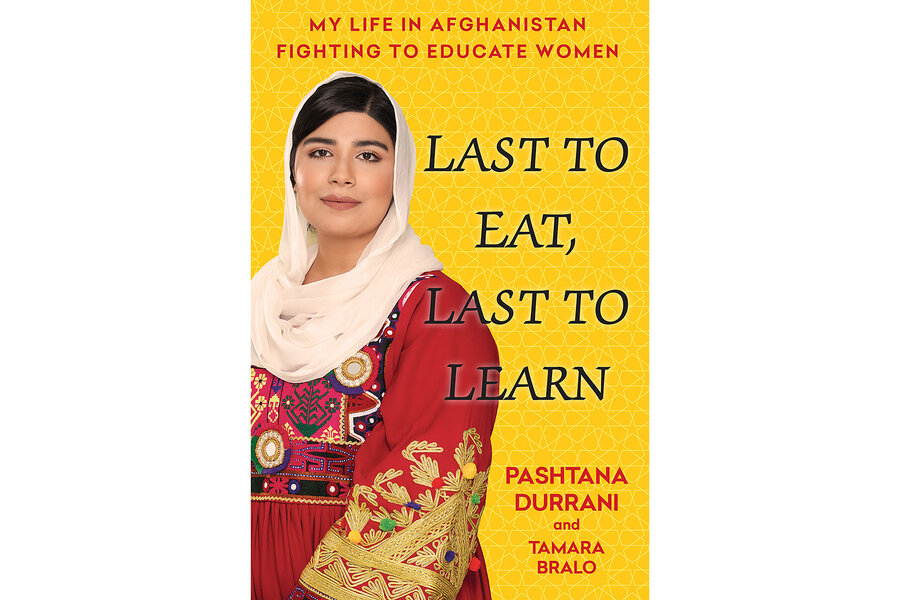She fled the Taliban, but leads efforts to help educate Afghan girls
Loading...
When the U.S. military officially withdrew from Afghanistan in August 2021, evacuation coordinators quickly drew up a list of individuals eligible for humanitarian parole: Afghan citizens who had cooperated with NATO in the past and those who worked for local nongovernmental organizations.
Pashtana Durrani ticked both boxes: As a fierce, outspoken champion of every girl’s right to an education, she had founded her own NGO and regularly visited the nearby NATO base.
She faced danger from the returning Taliban, and many people encouraged her to leave the country. But amid the chaos and destruction, Durrani felt she still had important work to do. Should she stay, or should she go?
“Last To Eat, Last To Learn: My Life in Afghanistan Fighting To Educate Women,” Durrani’s autobiography written with Tamara Bralo, provides an absorbing portrait. It depicts Durrani’s upbringing as a third-generation Afghan refugee in Pakistan, her admittance to the American University of Afghanistan in Kabul, and the passion with which she overcame initial challenges as an activist. It’s heartbreaking at times, too, but overall the book reads like a love letter to her community. There are beautiful possibilities to be found in Afghanistan, if one simply engages the right perspective.
For instance, Durrani makes the point that humanitarian aid doesn’t always need to come from sources outside one’s home country to have traction. Often, the best help is the kind that sprouts organically from within the local community itself. It was the example of Nelson Mandela that helped her to articulate this kind of approach. She writes, “The modern world sees caring for your community, for your tribe, as something to overcome on the way to becoming a modern country. Not Mandela. ... He didn’t think it was necessary to undo old structures before building new ones. For him, a tribe was a building block.” Durrani felt the same.
As someone who grew up witnessing the deprivations in rural areas of both Afghanistan and Pakistan, Durrani knew that raising more school buildings with charitable donations from overseas wasn’t going to ensure girls’ consistent access to an education. Brick-and-mortar schools were often leveled by the Taliban as soon as they were built.
What the girls needed was something portable and adaptable to any location or circumstance.
With a hefty dose of innovation and persistence, Durrani was able to create and run an NGO that provides lessons via solar-powered digital tablets. The tablets come pre-loaded with content, so the fact that Afghanistan largely has no internet isn’t a problem. And in places where gathering together is possible, Durrani rid the schools of any notion that they had to uphold the same hours as schools in the West. It’s the enforcement of Western hours that prevents many children from attending lessons, because that time of day is typically allotted for work that will allow the children to contribute to their families. It’s recognizing situations like this, on a regional level, that protects a child from having to choose between a full belly and a full mind.
Once her nonprofit LEARN took off, Durrani discovered stories of successful female students that reduced her to tears of joy. She became Amnesty International’s Global Youth ambassador, which she describes as “still one of my proudest achievements.” Her tribe also elected her as its khan, its leader, after her father died. When her younger brother turned 18, she relinquished the title to him, but she continues her fight for everyone’s right to be educated. Today, LEARN is educating more than 300 girls in Afghanistan in STEM, and Durrani faces ongoing danger from the Taliban by making trips into the country. She eludes detection by wearing the traditional, full-length burqa.
When the Taliban took back control of the government in 2021, Durrani knew that arming girls with even the most basic literacy could put her own life at risk. Amid the mass exodus from Afghanistan, she decided that rather than be a martyr and disappear in the mayhem before finishing her work, she would take the advice of her father’s longtime friend: “You can do so much more for them on the outside. ... In a few months, when everybody forgets about Afghanistan, you’ll be out there to remind them.”








